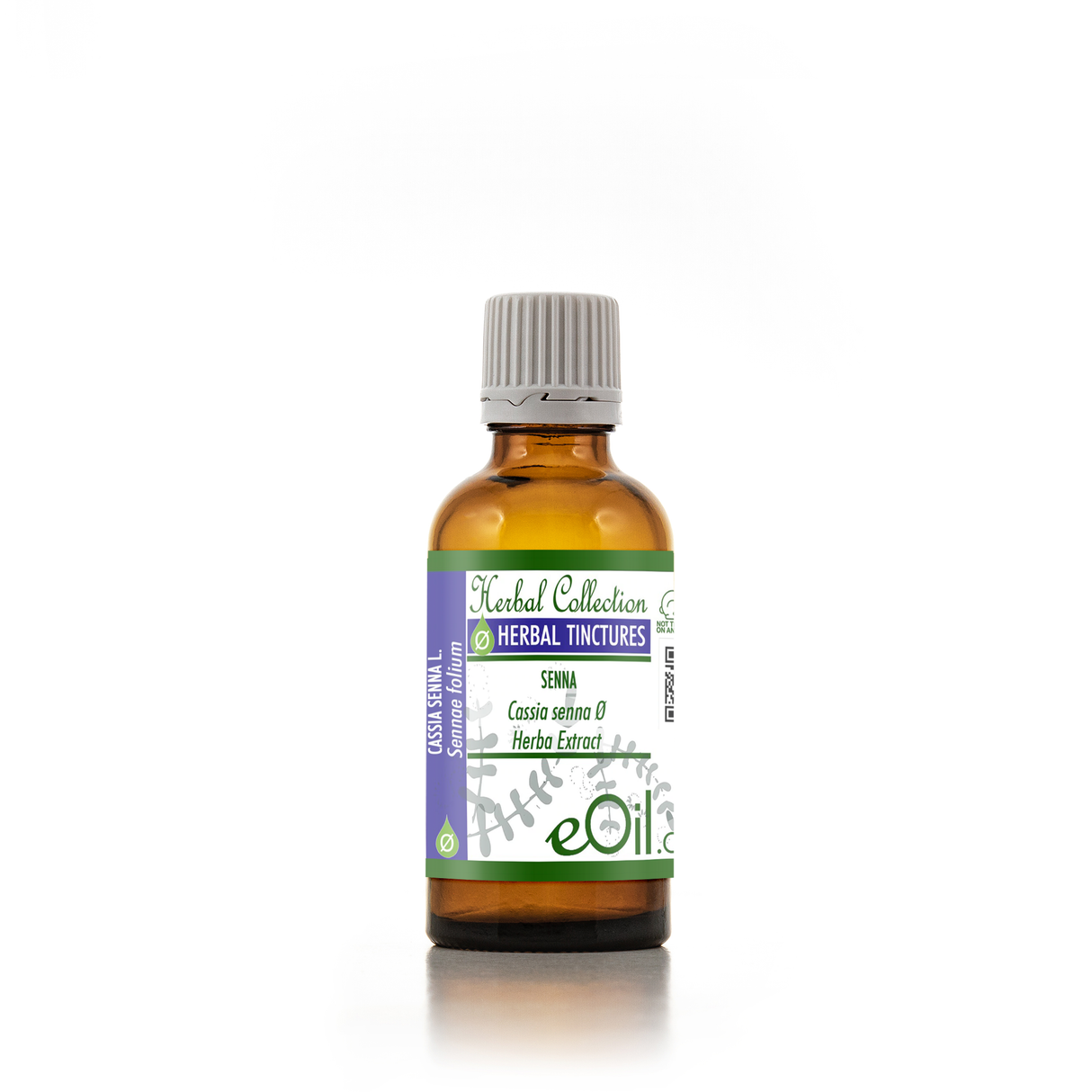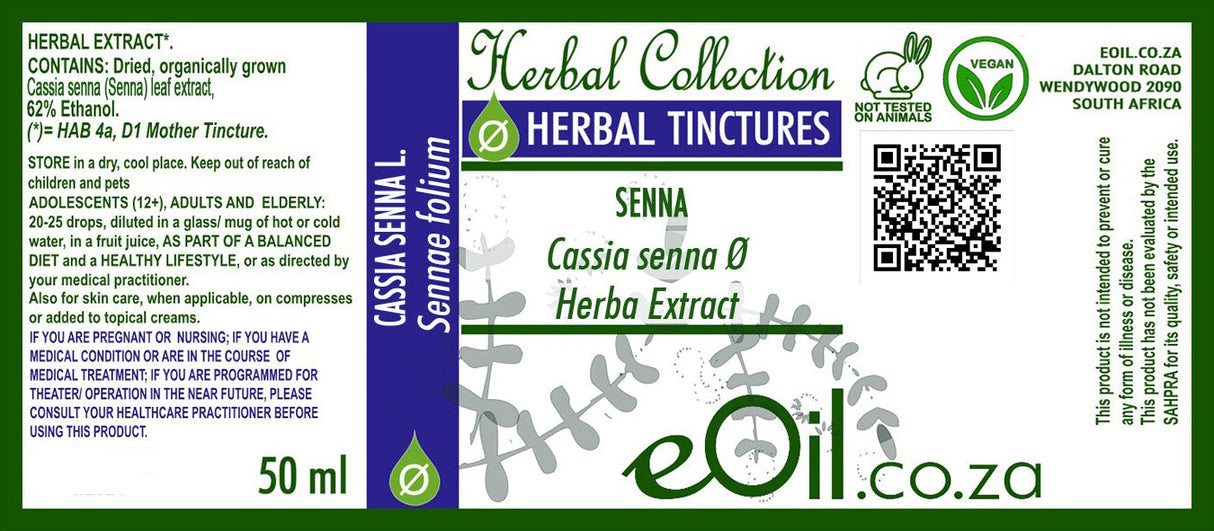Senna Liquid Herbal Extract
Senna Liquid Herbal Extract - 50 ML is backordered and will ship as soon as it is back in stock.
Description
Description
Understanding Mother Tinctures & Glycerines
Senna (Cassia senna) comes in Liquid Herbal Extract tincture, capsules, powder or cut leaves.
It is a plant-based supplement valued for supporting bowel regularity and digestive wellness.
Traditionally used for gentle, short-term relief of occasional constipation, this plant is additive-free, and ideal for daily wellness routines when taken as directed.
TRADITIONALLY USED FOR
Senna (Cassia angustifolia) Collection: Tincture - Powder - Leaves - Vegan Capsules
Effective natural solutions for gentle, short-term relief of constipation and digestive cleansing—available in multiple convenient forms for every preference.
Senna Tincture (Liquid Herbal Extract)
- Fast-acting, concentrated support for predictable overnight relief
- Benefits: Promotes bowel movements and colon cleansing for occasional constipation, or before travel or procedures.
- Directions: 1–2 ml (20–40 drops) in water at night, short-term only (max 7–10 days).
- Best for: Rapid action, those who dislike swallowing powders or capsules.
Senna Powder (Loose)
- Customizable, bulk option for herbal blends or DIY teas
- Benefits: Easily blended into herbal teas, smoothies, or wellness recipes for mild, flexible dosing.
- Directions: ¼–½ teaspoon (0.5–1.5g) per cup boiled water, steep 10–15 minutes, drink as needed at night.
- Best for: Herbal tea customizers, wellness blends, colon detox teas.
Senna Leaves (Dried)
- Traditional, gentle steeped tea for regularity and digestive cleansing
- Benefits: Stimulates natural peristalsis, relieves constipation, can be blended with ginger or fennel for comfort, useful in gentle detox teas.
- Directions: 1–2g (~1 heaped tsp) per cup water; steep 10–12 min, strain. Drink in the evening as needed, not daily.
- Best for: Traditional herbalists, detox protocols, natural tea users.
Senna Vegan Capsules
- Convenient, pre-measured, and travel-friendly botanical support
- Benefits: Hassle-free for those seeking standardized dosing and portability; same gentle laxative efficacy.
- Directions: 1–2 capsules (about 20–30 mg sennosides), once at night with plenty of water; follow package or professional advice.
- Best for: On-the-go, precise dosing, those who dislike tastes of teas/tinctures.
Senna Product Summary Table
| Product Type | Main Benefits | How to Use/Dose | Best For | Not For / Cautions |
|---|---|---|---|---|
| Tincture | Quick relief, gentle bowel cleanse, overnight | 1–2 ml in water, bedtime, max 7–10 days | Fast action, easy dose | Under 10, pregnancy, chronic GI/IBD issues |
| Powder (Loose) | Mix in teas, custom blends, gentle colon aid | ¼–½ tsp in hot water, bedtime, short-term | DIY blends, teas | As above, risk of overdose/long-term use |
| Leaves (Dried) | Traditional herbal infusion for regularity | 1–2g/cup, steep, drink once at night | Herbal tea, blends | As above |
| Vegan Capsules | Convenient, portable, standardized effect | 1–2 caps (20–30mg sennosides) at bedtime | Travel, simple routine | As above, not for daily use |
Quick Facts & Cautions
- Intended for short-term, as-needed use only (max 1 week) to avoid dependence or lazy bowel.
- Not for pregnancy, breastfeeding, children, IBD, GI obstruction, dehydration, or undiagnosed pain.
- Side effects may include cramping, diarrhea, potassium depletion, urine discoloration, or rare allergy.
- Do not mix with diuretics, heart drugs, or potassium-depleting meds without guidance.
- Hydrate well and discontinue if side effects occur.
INFORMATION
Source : http://www.wikiphyto.org/wiki/Cassia senna
Reference on http://www.wikiphyto.org
Translation in English by Google Translate (go to the page of the source linked | on Chrome cellphones go on the 3 dots on the top right and select translate in your preferred language | on laptop right click your mouse and select option translate when hoovering on the page
plant name
- Alexandria Senna, Khartoum Senna
- India senna , Tinnevelly senna
International Latin denomination
- Cassia senna L. = Cassia acutifolia (Delile) Batka = Senna alexandrina Mill.
- Cassia angustifolia (Vahl.) Batka = Senna (homeopathic name)
botanical family
Fabaceae subfamily Caesalpinioideae
Description and habitat
- Native to tropical Africa
- Subshrub or shrub about 1 to 1.5 m high, with compound leaves formed by an even number of leaflets
- Numerous yellow flowers of about 3 cm
- The fruit is a flattened pod (follicles), reniform, leathery, green-brown in color, open in two valves releasing few seeds (5 to 10)
History and tradition
- A plant used by Arab doctors from the 9th century, Indian senna was originally from the pre-desert regions of Arabia.
- Alexandria was the historical export port of Alexandria Senna
Parts used
- Fruit pulp (pod)
Dosage forms available
Usual dosages
- 2 to 6 cloves in cold maceration, infusion or decoction
Composition
Main components of the plant
- Hétérosides dianthroniques (dianthrones > 3 %) : sennosides A, B, C, D, E, F, et anthraquinones : rhéine, émodine
- Mucilage (2 to 3%)
- Flavonoids : derivatives of kaempferol
- Naphthalene glycosides: glucosides of tinnevelline , or 6-hydroxymusizine
Main components of buds or young shoots
Main components of essential oil
Properties
Plant properties
- Strong laxative, stimulant laxative
- Can cause colic
- It is associated with aromatic and antispasmodic plants that evacuate gases and relax the intestinal muscles
- Sennosides are dimers (obtained by drying and infusion at 40°) of hydroxyanthracene derivatives
Bud properties
Properties of essential oil
Indications
Indications of the whole plant (phytotherapy)
- Occasional constipation
- Anal fissures (when stools need to be softened)
- No more than 10 days of treatment so as not to weaken the muscles of the colon
Indications of the bud (gemmotherapy)
Specific indications of essential oil (aromatherapy)
Known or suspected mode of action
- Sennosides reach the colon through their sugars, activity after contact with the intestinal flora which reduces anthraquinones to anthrones, which stimulate motricity by a direct action, reduce the absorption of sodium, increase the secretion of potassium, and the passage of water in the intestinal lumen
- By causing contractions that lead to the emission of a stool 10 to 12 hours after ingestion
- Sennosides and mucilages also retain water in the colon, helping to soften stools
- The mucilages dissolve more or less and swell on contact with water to form gels or colloidal solutions
Usual formulations
Regulations
- French Pharmacopoeia list A (leaflet, fruit) of Cassia senna and Cassia angustifolia
Possible side effects and precautions for use
- Not in pregnant women
- Not in case of chronic constipation
Bibliographic references
CAUTION
Store in a cool, dry place, away from light. Keep tightly closed, away from the reach of Children and pets.
Do not exceed the daily dose.
This product is not intended to prevent or cure any form of illness or disease.
If you are pregnant or nursing ; If you have a medical condition or are in the course of medical treatment ; If you are programmed for theater/operation in the near future, please consult your healthcare practitioner before using this product.
This product cannot replace a varied and balanced diet and a healthy lifestyle.
This product has not been evaluated by the SAHPRA for its quality, safety or intended use.

Senna Liquid Herbal Extract - 50 ML is backordered and will ship as soon as it is back in stock.





